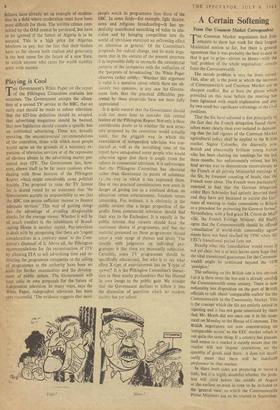Playing it Cool
rr lin Government's White Paper on the report
of the Pilkington Committee contains few surprises. The Government accepts the alloca- tion of a second TV service to the BBC, that an early start should be made to colour television, that the 625-line definition should be adopted, that advertising magazines should be banned, that new legislation should contain a specific ban on subliminal advertising. These are, broadly speaking, the uncontroversial recommendations of the committee, those with which most people would agree on the grounds of a necessary ex- pansion of television services or of the repression of obvious abuses in the advertising matter pre- seated over ITV. The Government has, how- ever, shown itself to be far more cautious when dealing with those features of the Pilkington Report, which might conceivably cause political trouble. The proposal to raise the TV licence fee is skated round by an assurance that 'the Government accepts its responsibility to see that the Efl3C can secure sufficient income to finance adequate services.' This way of putting things has the advantage of avoiding disagreeable shocks for the average viewer. Whether it will be of much comfort to the inhabitants of Broad- casting House is another matter. Pay-television is dealt with by recognising that there are 'cogent considerations in a contrary sense' to the Com- mittee's dismissal of it. Above all, the Pilkington recommendations for the reconstruction of ITV by allowing ITA to sell advertising time and re- stricting the programme companies to the selling of Programmes to the authority have been set aside for further examination and the develop- ment of public debate. The Government will Irtter table its own proposals for the future of independent television. In many ways, says the White Paper, independent television has been very successful. 'The evidence suggests that more people watch its programmes than those of the EBC. In some fields—for example, light theatre, news and religious broadcasting—it has un- deniably contributed something of value to tele- vision and by bringing competition into the world of telcvision exercised an enlivening effect on television in general.' Of the Committee's proposals for radical change, and its main argu- ment that in the context of the present structure it is impossible fully to reconcile the commercial purpose of the companies with the realisation of the 'purposes of broadcasting,' the White Paper observes rather coldly: 'Whether this argument is valid ..is a question about which there are ob- viously two opinions, in any case the Govern- ment feels that the practical difficulties pre- sented by these proposals have not been fully appreciated.'
It is quite natural that the Government should wish for more time to consider this central feature of the Pilkington Report. Not only is there considerable doubt as to whether the new struc- ture proposed by the committee would actually work, but the priggish way in which the examination of independent television was con- ducted as well as the moralising tone of the report have antagonised many people who would otherwise agree that there is ample room for reform in commercial television. It is unfortunate that the Pilkington Committee has obscured rather than illuminated .its. points of substance
y , the way .in which it has expressed them. Qne or two practical considerations now seem in danger of getting lost in a confused debate on education versus entertainment, freedom versus censorship. For . instance, it is obviously in the public interest that a. larger proportion of the profits from, commercial, television should find their, way to the Exchequer. It is equally in the public interest that viewers should have the maximum choice of programmes, and that the material presented on those programmes should cover. a wide range of themes and levels. The trouble with judgments on individual pro- grammes is that these are necessarily subjective. Certainly, some TV programmes should be specifically educational, but who is to say what effect X-typc.of entertainment has on Y-type of viewer? It is the Pilkington Committee'S immer- sion in these murky profundities that has blUrred its own image to the public gaze. No wonder that the Government declines to follow it into the discussion of questions which no modern society has yet solved.
'II tow,










































 Previous page
Previous page